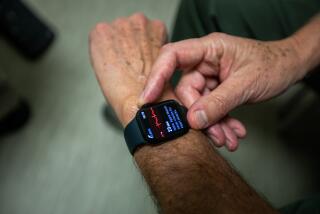Chip Manufacturer Is Denied Patent by Japanese Court : Computers: Ruling that Fujitsu chips don’t infringe on Texas Instruments’ patent may ignite trade concerns.
- Share via
In a decision that could reignite concern over Japan’s willingness to protect American inventions, a Japanese court ruled Wednesday that computer chips made by Japan’s Fujitsu Ltd. don’t infringe on Texas Instruments’ basic semiconductor patent.
The Tokyo District Court said Fujitsu’s most advanced memory chips are made with a different method than the one described in TI’s pioneering patent, and thus rejected TI’s request for an injunction blocking Fujitsu from manufacturing the chips.
TI said it was disappointed with the ruling and would immediately appeal it to the Tokyo High Court. “The net effect of this decision is that our invention of the integrated circuit was never accorded patent protection in Japan,” said Richard J. Agnich, general counsel at Texas Instruments.
The decision highlights American complaints that Japanese courts interpret patents too narrowly, allowing firms to essentially copy American inventions if they make minor, incremental changes to the invention.
“It’s a very serious problem, one of the most serious we have with Japan,” said a senior U.S. trade official. He said U.S. companies are more likely to hold important patents than Japanese companies and are more likely to be hurt by courts’ narrow interpretation of such patents.
“The recent (bilateral) agreements we made are procedural and easy to implement,” the trade official said. “It’s much more difficult when you are dealing with the courts and subtle issues of interpretation.”
The Tokyo ruling will weaken TI’s bargaining position when it negotiates licensing deals worth hundreds of millions of dollars with more than a dozen Japanese semiconductor companies in 1995 and 1996.
Jack Kilby, a TI engineer, helped launch the modern electronics industry in 1958 when he came up with the idea of shrinking down complex electronic circuits and placing them on a single, flat semiconductor wafer. TI filed a patent application for the invention in the U.S. in 1959 and in Japan in 1961.
The Japanese patent office granted TI a patent on one aspect of the Kilby invention in 1977--just two years before it expired and too late for TI to obtain any benefit from the patent. The patent office granted another patent in 1989 that was good until 2001.
That patent helped TI negotiate big increases in royalty payments from Japanese chip makers in 1990. The negotiations were part of TI’s strategy of milking patents for royalties--one that netted the company about $1 billion but infuriated rival U.S. and Japanese chip firms.
Fujitsu, alone among the major chip makers, refused to cut a deal with TI and the two firms went to court in 1991.






